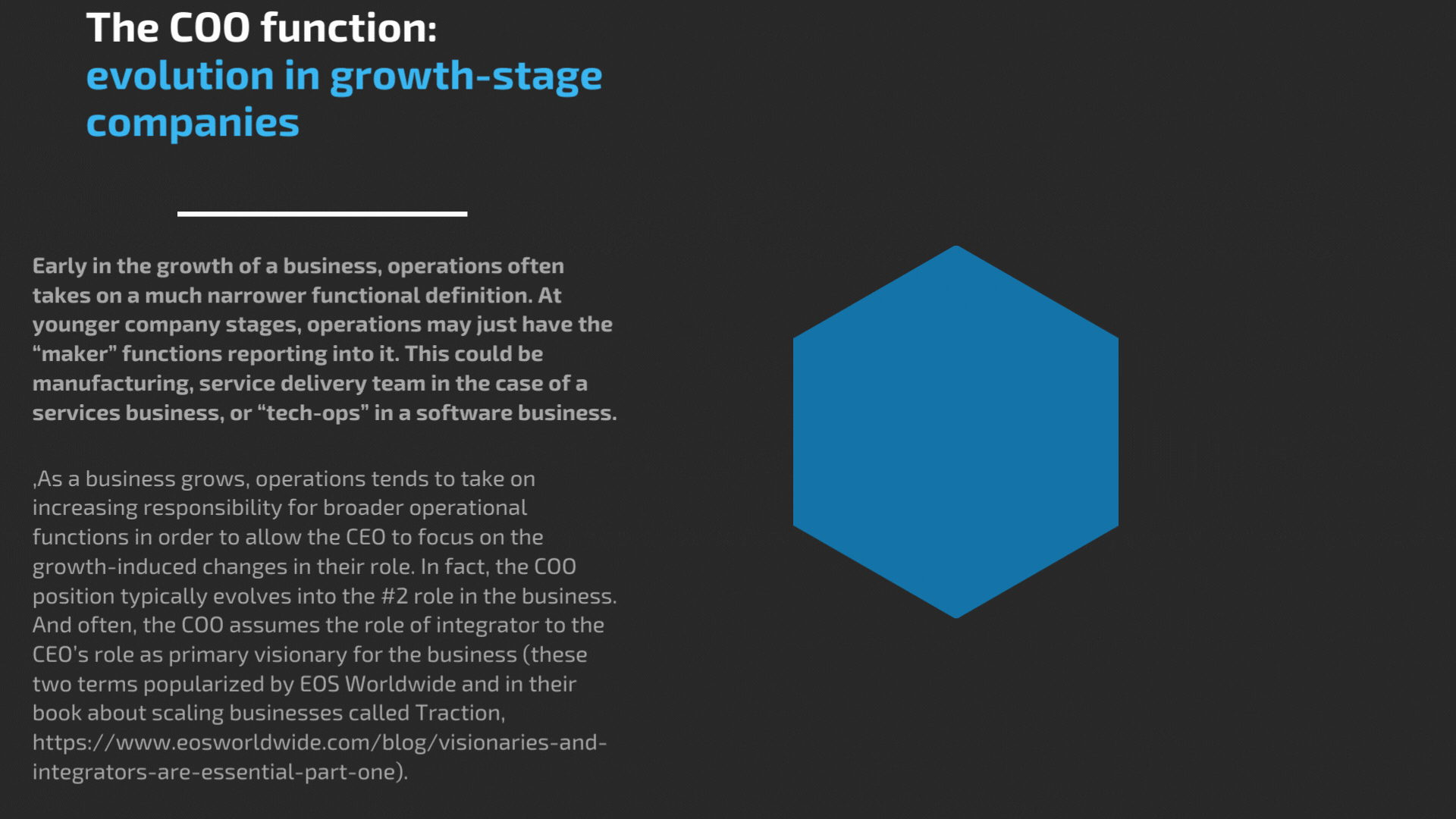The Evolution of the Operations Function
OPERATIONS & THE COO [CHIEF OPERATING OFFICER]

What are the organizational implications as a company grows?
Early in the growth of a business, operations often takes on a much narrower functional definition. At younger company stages, operations may just have the “maker” functions reporting into it. This could be manufacturing, service delivery team in the case of a services business, or “tech-ops” in a software business.
There are 3 lenses that are helpful to look through when looking at the evolution of the COO’s role as a business grows to further delineate the COO remit vs. the CEO and others within the leadership team:
First, as a business grows, operations tends to take on increasing responsibility for broader operational functions in order to allow the CEO to focus on the growth-induced changes in their role. In fact, the COO position typically evolves into the #2 role in the business. And often, the COO assumes the role of integrator to the CEO’s role as primary visionary for the business (these two terms popularized by EOS Worldwide and in their book about scaling businesses called Traction, https://www.eosworldwide.com/blog/visionaries-and-integrators-are-essential-part-one).
Second, often the CEO/COO relationship is one of CEO-as-outside-focused—markets, competition, innovation, vision, strategy—and COO-as-inside-focused—ensuring all the various functions are working in harmony, staffed appropriately, scaling efficiently, and being measured against goals, budgets and key performance indicators and adjusted as necessary in order to achieve corporate short and medium term goals.
Thirdly, another way to think about the evolving “two-in-a-box” relationship between the CEO and COO of a growing organization is to think about time horizons and the relative responsibilities of each leader over what time slices: for the COO, they are most often focused on the shorter-term time horizon— on daily, weekly, and monthly deliverables. In contrast, the CEO evolves their role to a longer-term focus, often calibrated by quarterly and yearly time horizons.
Here’s how it often breaks out by functional reporting responsibility as the business grows and the COO role absorbs increasing responsibility:
-
Operations
- [In manufacturing] fabrication & assembly
- [in distribution] warehouse/fulfillment
- [in software] software engineering
- [In services] service delivery
-
Customer Service
- For most businesses, regardless of whether manufacturing, distribution, software, or services, this is often referred to as any of the following
- post-sales support
- services (repair/maintenance etc.)
- customer success
- professional services
- For most businesses, regardless of whether manufacturing, distribution, software, or services, this is often referred to as any of the following
-
IT
- Information Technology often holds responsibility for the following areas, or has substantial accountability in partnership with other functions for them. These are all focused on what is used by the company to build/deliver its products or services, rather than the product output if a technology-focused business
- Computer hardware
- Computer software
- ERP
- Business intelligence
- [in manufacturing] Shop-floor hardware/software
- Scheduling/estimating software (if not part of ERP system)
- Computer networking
- Cyber security
- Employee ID/security/badging/access credentials for hardware, software, and company property
- Information Technology often holds responsibility for the following areas, or has substantial accountability in partnership with other functions for them. These are all focused on what is used by the company to build/deliver its products or services, rather than the product output if a technology-focused business
Often (but not always):
-
HR
- Think “Chief of Staff” vs. HR administration in this definition, a term popularized in politics and government but now increasingly adopted by tech companies more frequently to describe this “integrator” role and accompanying responsibilities
-
Sales
- Sales operations is a huge responsibility, often pulling in other departments including marketing that is helping sales on demand-generation and lead-generation, along with product marketing and other areas, as well as the finance function that is often contributing to sales as a feedback loop on revenue, commissions, cost of customer acquisition, actual-to-budget variances reporting etc.
-
Marketing
- Marketing often grows into a very complex function, and is often overseen by the COO on a day-to-day, week-to-week basis.

